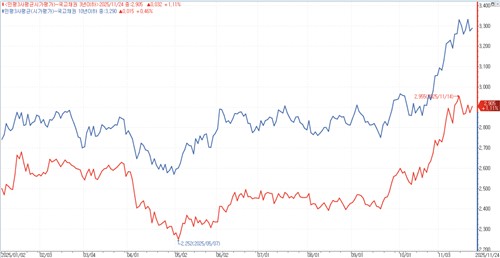
(Seoul=Yonhap Infomax) Jee Hyun Son – With the Bank of Korea’s November Monetary Policy Board meeting imminent, South Korea’s government bond futures market has seen notably thin trading in recent sessions.
As year-end approaches and caution mounts ahead of the final policy meeting of 2025, market participants are increasingly prioritizing the protection of existing gains over taking aggressive new positions.
According to the bond market on the 25th, trading volume for three-year government bond futures stood at 184,163 contracts in the previous session. This marks a decline from the usual 200,000 contracts, with volumes ranging between 160,000 and 180,000 contracts for three consecutive sessions since the 20th.
Ten-year government bond futures recorded 83,755 contracts, also below the typical 100,000-plus contracts. Since the 19th, volumes have remained at the 80,000 level for three straight sessions.
With such thin liquidity, even minor moves by foreign investors have led to heightened market volatility. In the previous session, a slight increase in foreign net selling during the afternoon triggered a market downturn, swiftly turning sentiment bearish. The market has become increasingly susceptible to shifts due to a lack of depth in order books.
Market participants attribute this to a combination of seasonal year-end factors, psychological caution, and the impact of the dollar-won exchange rate.
While sentiment has improved somewhat, supported by a recovery in short-term credit instruments, underlying instability remains, prompting a reluctance to take active positions. Many expect limited hawkishness from the November policy meeting and are focused on preserving profits accrued so far.
“Right now, there’s a conservative stance toward making additional bets,” said a bond dealer at a securities firm. “The only real play would be to expect a ‘long’ (buy) market at the November meeting, but that seems unlikely.” The dealer added, “This time, I plan to stay on the sidelines rather than engage in delta hedging.”
Additionally, the dollar-won exchange rate has surged past 1,470 won, creating an environment where the Monetary Policy Board is likely to maintain a hawkish stance for financial stability, adding further pressure on bonds.
“Given the dollar-won exchange rate, it’s questionable whether a dovish stance is even possible from a fundamentals perspective,” said another bond dealer at a securities firm. “If the Board signals that rate cuts are difficult due to the exchange rate, we can’t rule out a sharp ‘short’ (sell) move in bonds.”
The dealer continued, “Due to concerns over fundamentals, all maturities beyond two years remain unstable, dampening investor sentiment and contributing to thin market conditions.”
A bond dealer at a commercial bank noted, “There’s still no conviction on rates, and the elevated exchange rate is making the market even more cautious.”
jhson1@yna.co.kr
(End)
Copyright © Yonhap Infomax Unauthorized reproduction and redistribution prohibited.

